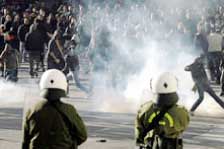
Archive 2009
|
December 16-31, 2008
Massive protests of Student youth and workers in Greece
What began with students organising a mass demonstration to protest the privatisation of higher education, has snowballed into a united action of workers and students against the pro monopoly agenda of the government, and the state repression unleashed on protesting university and school students. The killing of a 15-year old boy by the police during the first demonstation has galvanised the entire student community of the country onto the streets. The government of Greece has been privatising higher education, making it unaffordable for the mass of students. At the same time, it has been giving away billions of Euros in subsidies to the big banks and other business houses to ‘help them withstand the global crises’. This, together with the deteriorating condition of the working masses and the absence of a secure future has led to deep-rooted discontent among the youth in particular and the working people in general. Angered by the cold-blooded shooting of 15 year old Alexandros Grigoropoulos on Saturday 6th December 2008, thousands of youth came out on the streets in the capital Athens and Thessaloniki, Greece's second biggest city located in the north of the country. By Sunday, December 7th, 2008, the protests soon spread to many more towns and cities including Patras, and the islands of Crete and Corfu. A massive demonstration in Athens left the National Technical University of Athens, known as the Polytechnic, and marched towards the police headquarters on Alexandras Avenue. Protests continued through Tuesday December 9th, when the funeral for Alexandros turned into another massive anti – government demonstration. Several universities in Greece have been occupied by protesters Campuses in the capital and Thessaloniki, Greece’s second-largest city, have been taken over, and police are seriously considering seeking government permission to storm the campuses. Greece is a country which has a long history of protests by youth against injustice. The brutal repression of protests of the youth by the then military regime in 1973 led to an uprising which swept the junta away from power. At that time, the armed forces of the junta had stormed the campus. After that, every year, this event is commemorated with rallies all across Greece, in which the youth express their disgust with the imperialist system and vow to fight for a better future. On many occasions, the police have attempted to brutally suppress the protests. Notable occasions in recent years have been the 1999 protests against US imperialist chieftain Bill Clinton and the protests organised during summit of the European Union in Thessaloniki in 2003. On 10th December 2008, trade unions refused to heed the appeal of the government to call off a rally which had been planned much earlier but shifted its venue from central Athens to the Greek parliament. Workers demanded increased social spending in light of the global financial crisis, as well as higher wages and pensions. Teachers, journalists, bank clerks and public sector workers also took part in the action and public transport in a number of cities, including Athens, was hit hard by the strike. Protest actions by youth and workers continue as we go to the press. Once again the workers and youth of Greece have shown that they will not tolerate injustice and that they will continue to fight against the capitalist order for a better future for all the working people. |

